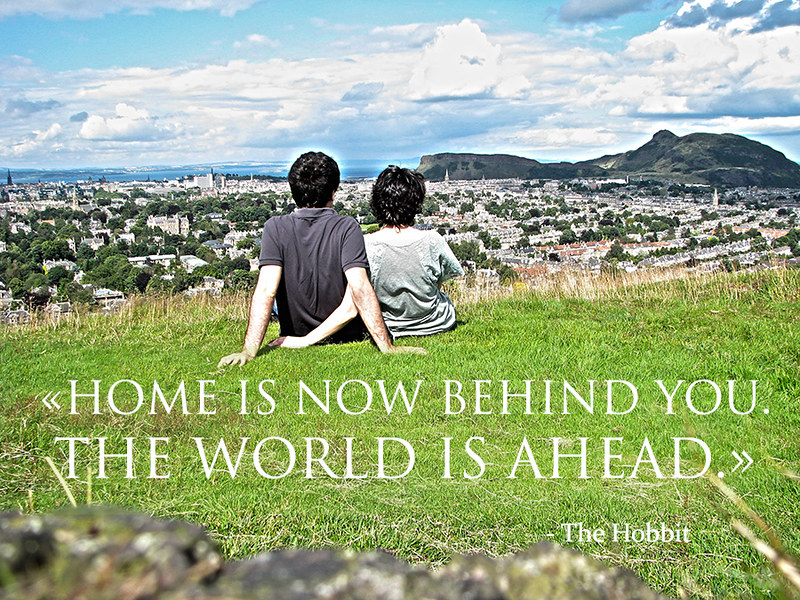I originally wrote and published this article in Spanish.
As we brace ourselves to move abroad for the third time in a few years, I look back and I know that squeezing our lives into a suitcase and leaving our native Barcelona was the best decision that we could have possibly made. Because when you move away, when you turn your life into a journey filled with uncertainty, you grow up in unexpected ways.

You face new challenges, you get to know parts of you you didn’t know existed, you’re amazed at yourself and at the world. You learn, you broaden your horizons. You unlearn, and after coming down and embracing a few lessons, you start growing in humility. You evolve. You feel homesick… and you shape memories that will stay with you forever. If you’ve ever lived away from home or embarked on a long journey, I’m sure you too have felt these 17 things that change forever when you live abroad.
1. Adrenalin becomes part of your life.
From the moment you decide to move abroad, your life turns into a powerful mix of emotions – learning, improvising, dealing with the unexpected… All your senses sharpen up, and for a while the word “routine” is dismissed from your vocabulary to make space for an ever rising adrenalin thrill ride. New places, new habits, new challenges, new people. Starting anew should terrify you, but it’s unusually addictive.
2. But when you go back… everything looks the same.
That’s why, when you get a few days off and fly back home, it strikes you how little everything has changed. Your life’s been changing at a non-stop pace, and you’re on holidays and ready to share all those anecdotes you’ve been piling up. But, at home, life’s the same as ever. Everyone keeps struggling with their daily chores, and it suddenly strikes you: life won’t stop for you.
3. You lack the (and yet you have too many) words.
When someone asks you about your new life, you lack the right words to convey all you’re experiencing. Yet later, in the middle of a random conversation, something reminds you about ‘that time when’…, and you have to hold your tongue because you don’t want to overwhelm everyone with stories from your ‘other country’ and come across as pretentious.

4. You come to understand that courage is overrated.
Lots of people will tell you how brave you are – they too would move abroad if they weren’t so scared. And you, even though you’ve been scared, too, know that courage makes up about 10% of life-changing decisions. The other 90% is purely about wanting it with all your heart. Do you want to do it, do you really feel like doing it? Then do it. From the moment we decide to jump, we’re no longer cowards nor courageous – whatever comes our way, we deal with it.
«It’s a dangerous business, Frodo, going out your door. You step onto the road, and if you don’t keep your feet, there’s no knowing where you might be swept off to.»
5. And, suddenly, you’re free.
You’ve always been free, but freedom feels different now. Now that you’ve given up every comfort and made it work thousands of miles away from home… you feel like you’re capable of anything!

6. You no longer speak one particular language.
Sometimes you unintentionally let a word from another language slip. Other times you can only think of a way of saying something… with that perfect word which, by the way, is in the wrong language. When you interact with a foreign language on a daily basis, you learn and unlearn at the same time. All the while you’re soaking up cultural references and swear words in your second language, you find yourself reading in your mother tongue so it won’t get rusty. Like that time when Homer took a home winemaking course and forgot how to drive.
7. You learn to say goodbye… and to enjoy yourself.
You soon realize that now, most things and people in your life are just passing through, and you instinctively play down the importance of most situations. You perfect the right balance between bonding and letting go – a perpetual battle between nostalgia and pragmatism.
8. You have two of everything.
Two SIM cards (one of them packed with phone numbers from all over the world), two library cards, two bank accounts… And two types of coins, which always end up mysteriously mixing when you’re about to pay for something.
9. Normal? What’s normal?
Living abroad, like traveling, makes you realise that ‘normal’ only means socially or culturally accepted. When you plunge into a different culture and a different society, your notion of normality soon falls apart. You learn there are other ways of doing things, and after a while, you too take to that habit you never thought you’d embrace. You also get to know yourself a little better, because you discover that some things you really believe in, while others are just a cultural heritage of the society you grew up in.
10. You become a tourist in your own city.
That tourist trap you may not have visited in your country only adds up to the never-ending list of things to do in your new home, and you soon become quite the expert on your new city. But when someone comes over for a few days and asks for some suggestions, you find it really hard to recommend but a few things – if it were up to you, you’d recommend visiting everything!

11. You learn how to be patient… and how to ask for help.
When you live abroad, the simplest task can become a huge challenge. Processing paperwork, finding the right word, knowing which bus to take. There’s always moments of distress, but you’re soon filled with more patience than you ever knew you had in you, and accept that asking for help is not only inevitable, but also a very healthy habit.
12. Time is measured in tiny little moments.
It’s as if you were looking through the car window – everything moves really slowly at the back, in the distance, while in front of you life passes by at full speed. On the one hand, you receive news from home – birthdays you missed, people who left without you getting the chance to say goodbye one last time, celebrations you won’t be able to attend. On the other hand, in your new home life goes by at top speed. Time is so distorted now, that you learn how to measure it in tiny little moments, either a Skype call with your family and old friends or a pint with the new ones.
13. Nostalgia strikes when you least expect it.
A food, a song, a smell. The smallest trifle can overwhelm you with homesickness. You miss those little things you never thought you’d miss, and you’d give anything to go back to that place, even if it were just for an instant. Or to share that feeling with someone who’d understand you…
14. But you know it’s not where, but when and how.
Although deep down, you know you don’t miss a place, but a strange and magical conjunction of the right place, the right moment and the right people. That year when you traveled, when you shared your life with special ones, when you were so happy. There’s a tiny bit of who you were scattered among all the places you’ve lived in, but sometimes going back to that place is not enough to stop missing it.

15. You change.
I’m sure you’ve heard about life-changing trips. Well, they’re not a commonplace – living abroad is a trip that will profoundly change your life and who you are. It will shake up your roots, your certainties and your fears. Living in Edinburgh changed us forever in many ways, and if it weren’t for that experience, we probably wouldn’t be about to embark on our next life adventure right now. Maybe you won’t realise it, or even believe it, before you do it. But after some time, one day you’ll see it crystal clear. You’ve evolved, you’ve got scars, you’ve lived. You’ve changed.
16. You fit your home into a suitcase.
From the moment you squeeze your life into a suitcase (or, if you’re lucky with your airline, two), whatever you thought ‘home’ was doesn’t exist anymore. Almost anything you can touch can be replaced – wherever you travel, you’ll end up stockpiling new clothes, new books, new mugs. But there will come a day when you’ll suddenly feel at home in your new city. Home is the person traveling with you, the people you leave behind, the streets where your life takes place. Home is also the random stuff in your new flat, those things you’ll get rid of in the blink of an eye when the time to leave comes. Home is all those memories, all those long-distance calls with your family and friends, a bunch of pictures. Home is where the heart is.

17. And… there’s no turning back.
Now you know what it means to give up comfort, what starting from scratch and marveling at the world every day feels like. And it being such a huge, endless world… How could you choose not to keep traveling and discovering it?
Have you ever lived abroad? Is there anything you would add to this list? Drop us a comment and tell us about your experience!
I originally published this article in Spanish a few weeks ago. Lots of people asked for an English version, but please bear in mind English is not my native language and this is only a humble attempt at a translation. I apologise in advance for any mistakes – if there’s anything you’d like to point out, please drop me a comment below. Thank you! Angie
ORGANIZA TU VIAJE
ATRACCIONES
Ahorra en Edimburgo con el billete Royal Edinburgh
AEROPUERTO
Reserva el bus del aeropuerto al centro de Edimburgo
TOURS EN ESPAÑOL
- Disfruta de la visita guiada al Castillo de Edimburgo
- Reserva el Tour gratis por Edimburgo
- Reserva el Tour gratis de Harry Potter y Edimburgo
EXCURSIONES POR ESCOCIA
Reserva las más populares:
SEGURO DE VIAJE
Imprescindible. Nosotros siempre usamos el de Heymondo con un 5 % de descuento para viajar en cualquier fecha (15 % para familias).
Paga en £
Nuestra tarjeta favorita para viajar y ahorrar comisiones es Revolut, que ofrece 10 € de bienvenida aquí.
INTERNET UK
Compra una tarjeta con datos ilimitados y conéctate desde el primer minuto con un 5 % de descuento.
HOTELES
Consigue las mejores ofertas reservando hotel en Edimburgo con antelación.










On my trip to the home town I have just felt everything described in #10 🙂
I have left my country 18 years ago, first to go to th UK, then a Caribbean island! I flip from one language to the other and as you said, sometimes the perfect word is in another language.
What I found out is that real friendship will last, superficial ones won’t. I discovered who my real friends are and a lot of them are family members. Internet and skype/FaceTime is a God Sent! Our oldest son is in The UK, the youngest in Australia.
It must be in our genes as most of my cousins have made their home abroad. What I miss the most from my home country, Belgium, is to chat, have giggles with friends who have know me all my life, to whom I don’t have to explain anything. I try to go back every other year and we get together, I so cherish those moments!!!
I just moved from a small city in central California to Sao Paulo brasil by myself after retiring at age 49. Your article was very much on point how I feel and my experience of moving abroad.
Brian
It’s true how you become a foreigner in your own hometown, after living abroad in more than 5 countries, I hardly recognise a lot of changes in my original hometown. While travelling & living abroad, one learns to respect all humans regardless of their race, religion, cultural beliefs etc and regardless of being in a 1st world or a 3rd world country, patience and understanding is second-nature – a great life lesson for all to learn and experience. Plus the joys of always having somebody in any country to visit!
Highly recommend moving around than stagnating in one place, if one gets the opportunity. From a “travel-addict” 😉
thank you so much for this, especially number 14. I am revisiting Prague and it isn’t enough to make me stop missing it by any means.
I think, as an American TCK who has lived in Europe and Africa (both as a child and as an adult) one thing I do not remember reading that is very true for me is a restlessness that is hard to ignore. When I am in one place, or one job, or one school more than 2 years, I start to want to be anywhere but there. I have gone to a boss and told her, “I am feeling restless. Please talk me out of moving away!” And the one point that I did not relate to was that the homeland does not change while you are away. I have always found the homeland nearly unrecognizable when I return, making that transition “home” far more difficult than going to another new land and learning another language, where everything is new and unexpected and fascinating.
Really identified with all your observations. Would add that you learn how it feels to be a foreigner, very humbling at times, but it makes for greater sensitivity and understanding of foreigners in your own home country.
Thank you for writing this! Very much true…and most of these things my mono-cultural friends may read and comprehend…but not ever understand (that is, except for the few that have gone out into other countries!)
One thing I would add:
“You grow in your acceptance of differences. And with that patience for differences. Why? Because at some level, you find, there is a reason for why and how they do what they do, even if it doesn’t make sense to you. After a while, the reasons may come up as the culture unveils itself, or a new friend describes the history, or the reason. And if they don’t, well, you still have to live with the differences! Either way, the culture and country isn’t going to change for you, so you learn to simply accept differences instead of fighting them. Upon returning to you “home culture” there is much more grace and acceptance given to people around who think and act different…because even if you don’t understand why, you know there must be a reason! So why judge or get upset?! Learn from it and learn a new perspective!”
I think these are the common feelings after a few years living abroad. As those years become decades, very few of the above feelings will survive, most having been replaced with mostly indifference to new places, languages and cultures. This is even more when you really expatriate yourself and cease going back home.
This is a fantastic translation! I moved away from home to go to university (within the same country though) so some of these things I can relate to.